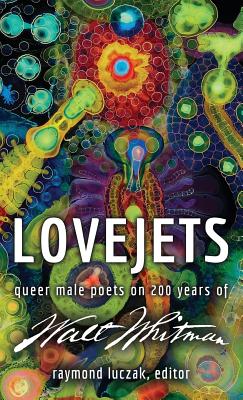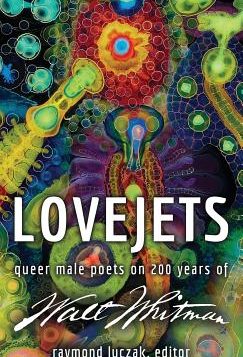 Lovejets: Queer Male Poets
Lovejets: Queer Male Poets
on 200 Years of Walt Whitman
Edited by Raymond Luczak
Squares and Rebels. 297 pages, $25.
THIS YEAR MARKS the 200th anniversary of Walt Whitman’s birth, though the poet seems to be reborn on an irregular basis for various derivative purposes. Thus when I received the small book titled Lovejets: Queer Male Poets on 200 Years of Walt Whitman, I sighed and assumed it would be the kind of insipid, self-congratulatory, gayish poetry that we often see in casual collections from little-known publishers.
I have never been more wrong about a book. This collection is one of the finest anthologies of poetry that I’ve ever read. The fact that all of the poems are either by or about gay men and their experience speaks to the power of our creative community. This collection has been assembled into a perfect pocket volume whose spectacular editorial content is matched by a well-crafted product. For all its portability, there are almost 290 pages of poems here, laid out in a distinctive, readable font on good paper in a solid binding. Luczak has done the heavy lifting and brought us a pocket book of gay male poetry—he calls it a hymnal—that I for one will return to again and again.
One of the most exhilarating aspects of this collection is the way it gathers and honors the varied voices of gay male poetry from many years of writing. We read, for example, Jericho Brown writing to and about Gerard Manley Hopkins, Essex Hemphill, and A. E. Housman, a poetic embrace of Whitmanian breadth from one of our best young poets. In “After Essex Hemphill,” Brown writes: “Somebody ahead/ of me seeded the fruit-/ bearing forest.” This lusciously entwined recognition of our gay poetic forebears in a few tight lines exemplifies what much of this book is about.
These poems often connect one gay poet to another in a lovely and poignant way. The late Reginald Shepherd is memorialized by Timothy Liu and Roberto Santiago. The latter re-uses the title “You, Therefore” from one of the best poems in Shepherd’s 2007 collection Fata Morgana for a new poem that is wonderfully reminiscent of Shepherd’s own merger of line-flow and word-banging.
Then there are such delights as Alex Gildzen’s celebration of the body à la Whitman, part by part, including such gems as “Brad Pitt’s Thighs,” “Jude Law’s Lips,” and so on. Fortunately, the dubious idea known as the “prose poem” is rarely brought in, though it works in the case of Trebor Healey’s “A Nightclub South of Market” about Allen Ginsberg, part of which reads: “Ah, dear father, graybeard, lonely old courage-teacher, clown and boy of song, what America do you leave behind and which do you look forward into? What reincarnated infant are you now, a baby of Dharma, born with its heart outside its body, struggling to breathe and longing to love.” This is a clear Ginsberg image, yet much of it is Whitman, too. Healey also reminds us, in a pæan to Cavafy and his taste for young men, that “Gods are not like wine/ they don’t age well.”
In one of the more direct inter-poet references, Charlie Bondhus channels James Merrill in “The Science of Séance,” a colorful takeoff on Merrill’s Ouija-board gossip in The Changing Light at Sandover. Notwithstanding the line “I vant to suck your teat” complete with bogus Transylvanian accent, the idea and execution are quite entertaining. We also read intentionally Whitmanesque pieces, such as Gary Boelhower replicating Whitman going down to the waters naked. Then there are some delightful fantasias on Whitman, like the sweetly modern and typically self-promoting Whitman of M. J. Arcangelini, who brings us “Walt Whitman Poses for Bear Magazine.”
Some of the poems are reprinted from other sources, sometimes from other decades, and some seem to be written specifically for this collection. This eclecticism could have been clunky; instead, it gives the collection a timeless feeling that’s enhanced by the theme of poems written to or about other gay poets. There are a few obvious typos, such as “dingy” for “dinghy” and “took fight” for “took flight.” Some modern poets are strangely absent, such as Mark Doty, Carl Phillips, and the late J. D. McClatchy (who is, however, memorialized by Liu). It may be that reprint rights could not be obtained. But there are certainly enough poems here to last us a while in a collection of voices that contains multitudes, like Whitman himself.
_________________________________________________
Alan Contreras is a writer and higher education consultant who lives in Eugene, Oregon.






